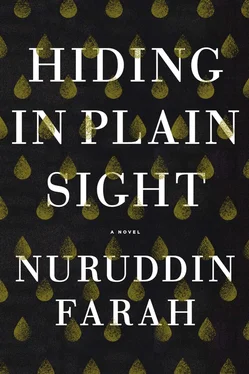When he had done anything to upset his mother, Aar learned that extra attentiveness to his sister would soften Hurdo toward him. They were a threesome, Hurdo, Aar, and Bella, flourishing together, never allowing anyone to come between them. For the first three years of Bella’s life, they lived just as they pleased, with no boundaries. And Bella appeared to benefit from their unusual closeness. She sat up at five months, had her first teeth at six, crawled at seven, and walked before her ninth month.
Yet Hurdo was aware that life couldn’t go on like this forever, with the three of them continually in one another’s hair, and she knew she would have to put a stop to some of Aar’s boyish mischief. In self-admonishment, she repeated to herself the Somali proverb that a parent must refrain from showing her smiling teeth to her children lest her children start showing their naked bums. Gradually, she began to introduce some order into their lives.
Bella continued to thrive. The world is at my daughter’s service and everyone in it is at her feet, Hurdo would say. Other children seemed to be infatuated with her. They threw tantrums when their parents arrived to fetch them home, crying their hearts out and insisting on staying longer and speaking of their wish to sleep in Bella’s room. Yet the moment Aar came home from school, Bella lost interest in them. Sometimes she would shoo them away disdainfully so that she could follow Aar around, going where he went and sitting where he sat, endlessly telling him things. At five or six, she threatened to kill any girls she imagined as rivals for Aar’s affection. In his absence, she often complained of feeling hunger. Asked what she craved, she would say that she longed for his return. Yet no amount of his indulgence seemed to satisfy her; Hurdo said he had the patience of a saint.
Hurdo spoke of her daughter’s attachment as a form of infatuation, comparing it to an infatuation she remembered from her own childhood. “When I was three,” Hurdo recounted to Marcella, “I felt drawn to a boy my age. My parents and the boy’s parents were amused at first. Then came the time when my parents and the boy’s parents quipped that the boy and I would marry.”
Marcella said, “Still, to experience love as hunger is a brilliant way of dealing with a complicated emotion. How apt! Your daughter is very smart.”
“Among Somalis,” Hurdo explained, “love is looked upon as an affliction, a sickness for which there is no cure. We believe that love is unattainable because true desire is impossible.”
Marcella thought that Bella’s childhood crush on her brother might make her the kind of woman men fell for and women were wary of, even hated by them. And Hurdo too worried that the intensity of Bella’s feelings for her brother were such that she might never allow herself to fall in love with anyone else.
But what was there to do? They would just have to see what would happen. And the bond between Bella and Aar stayed unbroken until Aar fell in love with a girl in Rome, and Bella went ballistic. Hurdo’s every attempt to explain things only made matters worse. Always a bad eater, Bella became anorexic, in the terrifying grip of a hunger that to her was synonymous with pining.
Eventually, her despair abated, when, thanks to a photograph of her that appeared in a fancy Sunday supplement published in Rome, she became a celebrity and began to earn a lot of money as a teen model. Bella had the uncanny ability to make her eyes flame a metallic green, and what with her exceptional looks and captivating smile, several agencies vied to represent her. After consulting Hurdo, Fiori negotiated a very favorable agreement with her with one of the best-known of them. Hurdo was not surprised when Digaaleh rang them from Mogadiscio, raising his objections, disconsolately comparing Bella’s work and the exploitation of her image to prostitution. Hurdo let him fume, seeing his reaction as that of a typical Somali father and knowing he could do nothing to stop Bella from pursuing her heart’s pleasure, while earning good money to boot.
Digaaleh, however, insisted she had misunderstood his intentions. “Essentially, it depends whether one sees Bella as Somali and therefore Muslim — and Muslims don’t go into modeling or exploit their image in exchange for cash — or Italian and therefore free to do as she pleases.” But Hurdo cut him off, saying that Bella was indeed a free person, able to make her own choices in life, and that no one had the right to impose their cultural or religious dictates on her just because she hadn’t yet attained the age of majority.
“I don’t wish Giorgio to decide her fate,” Digaaleh said.
“Well, if it comes to that, he will,” Hurdo retorted, “because he is her father.” Then she was hung up on him — and not long after, word came from Mogadiscio that he had died. And it wasn’t until many years later, at Giorgio Fiori’s funeral, that Bella heard about this heated exchange, from Marcella.
Bella has long been of the belief that there are no people on earth more narrow-minded or chauvinistic than Somalis, for whom appearances — the clothes one wears, the way one moves — matter enormously, especially when it comes to women. She recalls too that when she took up smoking and dressing in jeans, the Somalis she met in Rome, or Toronto whenever she visited, found both habits provocative and offensive in equal measure. (Looking at her fingers now, she can still see them in her memory as they were: stained brown with nicotine, as she held a fresh cigarette between them, lighting it with the butt of the previous one.)
—
It was Giorgio Fiori who sparked what would become Bella’s true vocation, for it was in his house that she saw the first piece of art that ever took her fancy — the inspiration for making art herself. It was a carving from the Dogon in Mali — a simple figure with a cylindrical body, rods for arms, broken bits of colored glass for eyes, thrown together as if in haste — that she had glimpsed in silhouette at dusk in the house he rented during one of his intermittent teaching stints in Mogadiscio during her childhood. The natural light was fading and the electric lamps had not yet come on. The carving struck her as the most beautiful thing she had ever seen or held in her hand; she was very impressionable.
She did not know then that Fiori was her mother’s secret lover, but as she held the piece, admiring its detail, she admired its owner by extension for choosing a work of such finesse. From that moment she began to adore him and to love her mother all the more for the adoration she sensed in her.
Fiori had other pieces too, which he would show her later. By then she knew that he was her father; speaking in Somali, he told her that he’d kept them hidden away from the prying eyes of the Somalis when he lived there, not knowing what impression the carvings might make on such an unlearned lot. As Muslims, perhaps they’d have accused him of engaging in idol worship. But none of the pieces, much as she admired them, inspired the same reaction as that first piece. She’d wanted to possess it, pure and simple. Of course she could have it, Giorgio said. Hurdo tried to persuade Bella to withdraw her demand, but Bella wouldn’t back down. Hurdo explained that the piece was one of a series and Giorgio’s favorite, and that it would upset the balance if the piece was separated from the rest. Nothing doing: Bella wanted that one and no other. In the end, she accepted a compromise: She could borrow the piece for a month and keep it in her room on her windowsill provided she took good care of it. Bella charged headlong into Giorgio, hugging him and blurting her thanks.
Each night, Bella went to sleep with the piece in her sight, and it was the first thing she looked at when she woke. It made her feel fulfilled, joyful, satisfied with life. She worked harder in school, earned better marks, and became more purposeful and organized. She volunteered to do the dishes when it was her turn without talking back to her mother. Giorgio couldn’t make sense of his daughter’s infatuation and predicted that it would be no more than a passing fad, like several others she’d gone through. But neither her devotion to the piece nor her interest in art nor her newfound sense of purpose and discipline wavered.
Читать дальше












